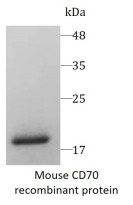ARG70471
Mouse CD70 recombinant protein (Active) (His-tagged, N-ter)
Mouse CD70 recombinant protein (Active) (His-tagged, N-ter) for SDS-PAGE
Overview
| Product Description | E. coli expressed, His-tagged (N-ter) Active Mouse CD70 recombinant protein |
|---|---|
| Tested Application | SDS-PAGE |
| Target Name | CD70 |
| Species | Mouse |
| A.A. Sequence | Gln47 - Pro195 |
| Expression System | E. coli |
| Protein Full Name | CD70 antigen |
| Activity | Active |
| Activity Note | Determined by its ability to induce proliferation in mouse T cells in the presence of the anti-CD3 antibody. The ED50 for this effect is < 4.5 μg/mL |
| Alternate Names | CD70; CD70 Molecule; CD27L; CD70 Antigen; CD27 Ligand; CD27-L; CD27LG; TNFSF7; Tumor Necrosis Factor Ligand Superfamily Member 7; Tumor Necrosis Factor (Ligand) Superfamily, Member 7 |
Properties
| Form | Powder |
|---|---|
| Purification Note | Endotoxin level is less than 0.1 EU/µg of the protein, as determined by the LAL test. |
| Purity | > 98% (by SDS-PAGE) |
| Buffer | PBS (pH 7.4) |
| Reconstitution | It is recommended to reconstitute the lyophilized protein in sterile water to a concentration not less than 200 μg/mL and incubate the stock solution for at least 20 min at room temperature to make sure the protein is dissolved completely. |
| Storage Instruction | For long term, lyophilized protein should be stored at -20°C or -80°C. After reconstitution, aliquot and store at -20°C or -80°C for up to one month. Storage in frost free freezers is not recommended. Avoid repeated freeze/thaw cycles. Suggest spin the vial prior to opening. |
| Note | For laboratory research only, not for drug, diagnostic or other use. |
Bioinformation
| Gene Symbol | CD70 |
|---|---|
| Gene Full Name | CD70 Molecule |
| Background | The protein encoded by this gene is a cytokine that belongs to the tumor necrosis factor (TNF) ligand family. This cytokine is a ligand for TNFRSF27/CD27. It is a surface antigen on activated, but not on resting, T and B lymphocytes. It induces proliferation of costimulated T cells, enhances the generation of cytolytic T cells, and contributes to T cell activation. This cytokine is also reported to play a role in regulating B-cell activation, cytotoxic function of natural killer cells, and immunoglobulin sythesis. |
| Function | Cytokine which is the ligand for CD27. The CD70-CD27 pathway plays an important role in the generation and maintenance of T cell immunity, in particular during antiviral responses. Upon CD27 binding, induces the proliferation of costimulated T-cells and enhances the generation of cytolytic T-cells. |
| Cellular Localization | Membrane |
| PTM | Disulfide bond, Glycoprotein |
Images (1) Click the Picture to Zoom In






